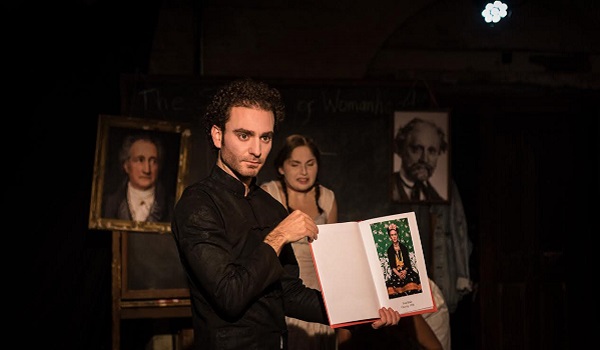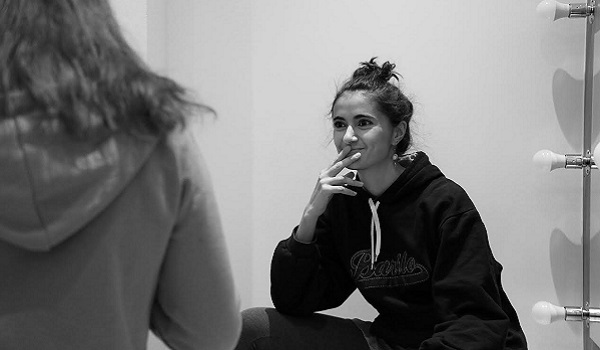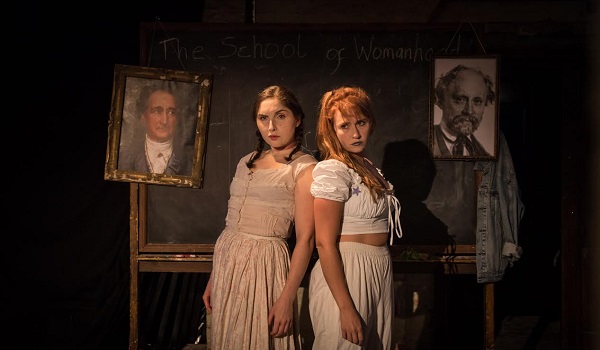Don’t Be Absurd, a new theatrical collaboration between Kesia Guillery (director and theatremaker) and William Farquarson (bassist/guitarist with indie band Bastille), are bringing ‘SLUTS’, an eclectic theatre show about sexuality, language, and slut-shaming through the centuries, to VOILA Festival at Applecart Arts from the 12th-17th November.
The show features a deviant schoolmistress who inducts you into her School of Womanhood. She wants to form you (all of you) into real women. Women of NOW. But she isn’t quite sure what that means.
What she does have, is a lesson plan. She has two examples for you to study – examples of what not to do. Gretchen & Klara – the two central women of two classic German plays (‘Faust’ & ‘Maria Magdalena’) – will relive their stories. Both stories end in death, because both women get something very, very wrong. They’re SLUTS.
The performance uses short excerpts of the original German but is accessible to English-speakers through translation and newly devised material. It is an investigation of persisting social judgments on what women should do with their bodies, and an experiment in cross-linguistic theatre.
What do vaginas have to do with German grammar?
This is the boiled down version of a question I have been obsessing over as I have tried to clarify over the past few months why SLUTS exists.
It’s a show about two main things: women’s contemporary experience of sexuality, and German literature. It takes two classic stories of sexual transgression from the German canon as a springboard for enquiry into the ways in which the narratives available to us mould our perceptions here and now.
SLUTS is a show that has seductive dances, feminist rap, dildos, and Beyoncé.
SLUTS is also a show that has German poetry. In German.
The answer I settled on, in the end, was that when vaginas speak, they speak in a maligned sort of a language to which we primarily react with faint ridicule, residual fear, and blanket disinterest. A lot like German.
For so long there has been no language for the female sexual experience. Maybe we are embarking on a new era, in which we are beginning to construct that language. The symbols available to us, though, through their newness, are crude, sometimes clumsy, approximative, and often imbued with the aggression of their recent reclamation from the goddamn Patriarchy: what do we have to work with?

Dildos, yes.
The Dominatrix.
The Witch.
Song lyrics…
Tonight I’ll be your naughty girl
(Beyoncé, Naughty Girl)
I’m not a stallion I’m a stallionness
(Jennifer Rostock, Hengstin)
These are our symbols. They thus form a language dismissed by some as forced – a wilful cross-identification with patriarchal modes of viewing sex as transgression, domination/submission, irrational, that erase the real female experience. Others dismiss this new language as frightening in itself – the outpouring of a female sexuality that is still associated with the threat of a wild nature opposed to civilised human boundaries. Case in point – the set of SLUTS includes large billboards plastered with the contradictory ‘rules’ of correct womanhood: Don’t be a slob Don’t be a slag Don’t be timid Don’t be a bore Don’t be obnoxious Don’t be a prude Don’t be horny etc etc. Whilst we were transporting these billboards, a fellow helping carry them, who had no idea what they were for, saw fit to congratulate the designer (Concetta Reuss) on her upstanding morals.
Anyhow – without labouring the point on German being a language ‘feared’ by Brits – it is, in London, definitely foreign, and I think there is huge value in exposing ourselves to language we do not understand: not just in passing, on the tube, muscling your way across Trafalgar Square, or browsing Tesco’s World Foods aisle, but attentively.
There’s an interview between Édouard Glissant and Lise Gauvin (both writers/literary critics/linguistic theorists), in which Glissant formulates the idea of an ‘Imagination of languages’ – a cross-linguistic state of mind in the age of globalisation, in which we are all permanently aware of the existence of infinite alternatives to our own personal language, be that mono- or multilingual. This can cause us to cling unhealthily to the familiar, and to artificial demarcations, but it can also allow us to move away from concepts of the linguistic Other. There can be no Us and Them within an infinity of possibilities.
Which is why it is perhaps very important to occasionally listen to snippets of German poetry, as well as the whisperings of vaginas (your own or those of others), without understanding their literal meaning: if we want to relearn our perceptions, and the power structures we are ready to discard, we need to remember the incomprehensibility of language from that infantile state of learning, when sounds and flickering images first began to form patterns. It was a state of Imagination, with Glissant’s infinity of possible languages at our fingertips.

It is no coincidence that this same learning period is when we are most engaged with narrative, and stories. It’s listening to Hans Christian Andersen, and watching Disney, before we even really understand what Ursula is saying to Ariel, that we learn what narratives are and aren’t possible, and what elements of stories are significant. (She’s telling her, if you care to know, that ‘on land it’s much preferred for ladies not to say a word, And after all dear, what is idle prattle for? True gentlemen avoid it when they can, It’s she who holds her tongue who gets a man.’) If we want to unlearn sex as possession and oppression, and relearn it as connection and mutuality, we have to look at the sexual narratives available to us today, and their historical origins (the narratives of narratives), and see them within the infinity of other possible stories and languages inherent in this childlike state.
Reminding ourselves of this state by exposing ourselves to languages we do not understand, and looking for meanings in their use external to their codified and alien grammars, reminds us of more than the fact that we didn’t pay enough attention in GCSE Spanish. It can maybe remind us that there are other ‘languages’ in life – like those of politics, of sexuality, of pop music, of literary canons – that can be viewed from outside of their own grammatical rules, and understood as patterns within a vast network of alternative possibilities.
The moral being… listen to more German poetry, it’ll make you better at sex.
EXTRACT FROM SLUTS:
But that’s what they’re there for right? Vaginas? To have things put in them. It sort of feels like that’s what it wants. I mean the most of the time I’m not really aware of its wanting anything, it’s just there, like a fingernail. But if I really concentrate on my fingernail I’m pretty sure I can’t feel it wanting anything. Except if it’s really grimy and there’s so much gunk under there that you can kind of feel the gunk in between the flesh and the nail, then the fingernail definitely wants digging into and it wants that gunk outta there. But my vagina, if for whatever reason something comes up that makes me remember it’s there, then I might think – hey, I’ll check in. I’ll see what’s up. And if I concentrate hard enough, I can just about feel that it’s sort of – wanting. Ever so gently wondering whether it wouldn’t perhaps be that little bit more content with its position in the cosmos if it had something in it. So traditionally I think that’s why they put penises in.
Or maybe it only thinks it wants something in it because traditionally they’ve been putting penises in for such a long time. I can’t be sure.
Written by Kesia Guillery.
Don’t Be Absurd present
SLUTS
Voila! Europe Festival 2018
Applecart Arts
170 Harold Road
London E13 0SE
Tickets and Info: voilafestival.co.uk
Twitter: @dontbeabsurd1

